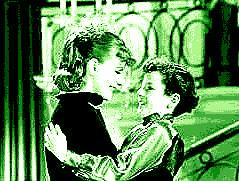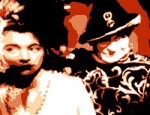Film Review
Greta Garbo radiates passion, exuberance and pathos as the tragic
Tolstoy heroine in this, possibly the finest screen adaptation of
Anna Karenina. Garbo
had previously played the role in a silent 1927 version entitled
Love, directed by Edmund Goulding,
which also featured her off-screen lover John Gilbert. The
actress cited this as her favourite of the seven films she made with
director Clarence Brown, and the part won her the New York Film Critics
Circle Best Actress Award in 1936.
A lavish David O. Selznick production, this version of
Anna Karenina captures the essence
of Tolstoy's great novel, focussing on the heroine's experience of a
love that consumes her and then drives her to destruction. The
moody photography heightens the sense of impending tragedy as Anna
Karenina's ill-fated love carries her to an inescapable doom. The
film's climax is devastatingly poignant - so cruel that it is almost
unbearable to watch, a striking visual symbol of the destructive power
of love.
© James Travers 2008
The above content is owned by frenchfilms.org and must not be copied.
Film Synopsis
During the 19th century, Anna Arkadyevna Karenina undertakes a trip to Moscow
in the hope of saving her brother Stiva's marriage. On the way, she
makes the acquaintance of Count Vronsky, a handsome young officer in the
Imperial Russian army. Even though she is married - to a prominent
statesman, Alexei Karenin - and has a son, Anna cannot help falling in love
with the fine military man. Leaving Moscow for St Petersburg, Anna
is pursued by Vronsky, who ignores her appeals to give up his interest in
her. By now, the two are desperately in love, but when Anna asks her
husband for a divorce he flatly refuses, fearing the scandal this may cause.
She has no choice now but to abandon her home and her family so that she
can continue her love affair with the man who means more to her than anything
in the world, Count Vronksy...
© James Travers
The above content is owned by frenchfilms.org and must not be copied.



